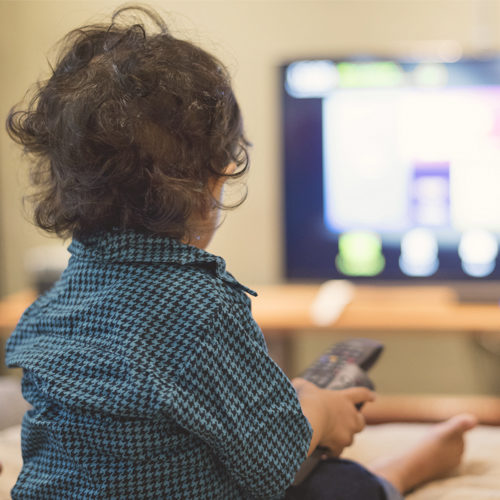How screen time hinders child development

American Academy of Pediatrics states that children under the age of 2 should not watch videos or consume any form of digital media content.
With TVs and phones everywhere, there is an increasing temptation to entertain and educate babies with media content on screens. However, leading child psychologists, early learning professionals, and the American Academy of Pediatrics all advised against it. Here are the reasons why:
A baby’s brain is not wired to learn from TV or videos
The way TV affects children below the age of 2 is different from older children, and the reason lies at the level of brain development. Although babies have all the brain cells they will ever have at birth, the all-important connections between the brain cells, which is necessary for brain functions, are still forming.
Usually, it takes about 18 months for a baby’s brain connections to develop to the point where the baby can make sense of the symbols on a screen. Before then, television is just a stream of 2-dimensional pictures that change about every 6 seconds, with no apparent connection to each other, the accompanying sounds, or the real people and objects around. To put it differently, the content from the TV is like mental junk food for Your Child.
Babies and toddlers learn from active interactions
The most crucial factor for the brain development of young children is the interaction with real people. Learning, at that stage, occurs almost exclusively through active participation, but watching TV is a passive activity.
In fact, Your Child learns a lot more from banging pans on the floor while you prepare lunch than they do from watching videos for a similar amount of time. Here’s why. With every such repetition, children learn to make the connection that their action (hitting the pan on the floor) caused the sound that follows. This teaches them cause and effect, also known as the principle of causation.
Learning, for young children, involves touching physical objects, feeling them, playing with them, and, most of all, seeing the faces and hearing the voices of those they love. In other words, active interaction with you and other adults around them is the most important element of learning at this stage.
Even passive TV can impair your child’s learning
The TV can be a serious form of distraction for Your Child, as it can reduce quality-time your child spends with you, other people, or their play toys. Research has shown that even if no one is watching the TV, just having it in the background can be enough to delay a child’s language development. It was found that, on average, parents normally speak about 940 words per hour when a toddler is around. But when the television is on, that number falls by 770 – and fewer words result in less learning!
What you can do to help your baby
To help your baby’s brain development, here are the things you need to do:
- Use screens only for facetime with other family members
- Limit the time your child spends in front of screens
- Limit how often you watch TV or use your phone in presents with your child
- Switch off the TV when you are not watching it
- Avoid feeding your infant or toddler in front of the TV
Verified:
Ketsupa Jirakarn (Mental health specialist) (31 March 2021)



